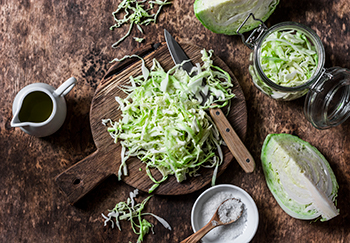More Health and Nutrition Bites
Related
How the Standard American Diet (SAD) affects the brain
The agricultural and industrial revolution made fats and sugars more available and affordable, leading to a typical American diet that is high in fat and refined carbohydrates (high in sugars and simple starches) and low in complex carbohydrates and fiber. Low fruit and vegetable intake have also contributed to the reduction in the amount of fiber in American diets.
Best way to get your vitamins? Eat them.
Certainly there are times when it's a good idea to take extra vitamins or other supplements, but these are limited to people in pretty specific populations: for example, during pregnancy, if you are a woman of childbearing age, or if you are following a vegan diet. However, in our well-fed Western culture it's pretty rare to really need to take vitamins.
Red Wine Good for Old and Young
"Free radicals" are natural and normal side effects of your body's processing of oxygen into energy. "Antioxidants" are those molecules that help your body remove those free radicals before they can contribute to such conditions as heart disease, stroke and diabetes. Researchers believe that as the body ages the process does not work as well, which may help explain why older people appear to be more likely to have these conditions.
Health & Nutrition Bites
Get the latest health and diet news - along with what you can do about it - sent to your Inbox once a week. Get Dr. Gourmet's Health and Nutrition Bites sent to you via email. Sign up now!
Live longer with cabbage

It's believed that chronic conditions such as cancer and heart disease are due at least in part to chronic, systemic inflammation. This is why anti-inflammatory diets, like the Mediterranean Diet, are becoming so popular: they help reduce inflammation and thus are thought to reduce your risk of cancers and other conditions.
A specific compound called isothiocyanates are thought to be especially effective in helping to reduce inflammation and oxidative stress. These compounds are mostly found in cruciferous vegetables, including broccoli, bok choy, and cabbage. Interestingly, isothiocyanates are created when cruciferous vegetables are either chewed or cooked.
The Japanese consume more than three times the amount of cruciferous vegetables than Westerners. Researchers in Japan decided to take a closer look at the Japanese intake of cruciferous vegetables to see if higher intake meant lower risk of death from inflammation-related conditions (Clin Nutr 2019;(38)631-643).
The authors used data gathered in a large-scale, prospective study that began in 1990 and included nearly 90,000 men and women who were without cancer, heart attack, or stroke and were between the ages of 40 and 69.
Initially the participants responded to a 138-item Food Frequency Questionnaire that included both portion sizes and 9 levels of frequency of consumption (e.g., never, 1-2 times per week, 2-3 times per day, etc.). Eleven cruciferous vegetables (three of which were pickled) appeared on the survey and included cabbage, broccoli, bok choy, mustard leaves, and Swiss chard. Further surveys gathered information on demographics, health history, and smoking status.
At the close of the study, at the end of 2014, the authors were able to ascertain the cause of death for the over 15,000 people who had died by consulting with the Ministry of Health, Labor, and Welfare.
The amount of cruciferous vegetables the participants consumed was grouped in 5 increasing levels of consumption. Compared to the men at the lowest end of the spectrum, those in the highest level of consumption were 14% less likely to die of cancer. For women, those in the highest level of consumption were 28% less likely to die of heart disease, 22% less like to die of cerebrovascular disease (such as stroke), and 40% less likely to die of an injury. Men were 21% less likely to die of any cause, while women were 17% less likely to die of any cause.
This is a prospective study, meaning it can only truly show correlation - that's why I noted that eating more cruciferous vegetables meant a lower risk of dying from an injury. Thus cruciferous vegetables alone may not be the cause of the lower risks of cancer and heart disease, although the authors noted that those who ate more cruciferous vegetables tended to be older, ate more fruits and vegetables, and tended to not be current smokers. They also were more likely to have high blood pressure and diabetes.
What this means for you
The lowest quintile of intake among the Japanese is about the same amount as most Westerners usually eat. Adding more cruciferous vegetables to your diet can't hurt - more vegetables are always better - and may help you avoid cancer and heart disease.
Here are a few of my favorite recipes featuring cruciferous vegetables:
Kapusta
Cole Slaw
Whitefish with Braised Red Cabbage
Napa Cabbage Salad
Healthy Asian Beef with Broccoli
Beef and Broccoli Salad
Roasted Broccoli with Garlic
Broccoli Cheese Soup
Spicy Mustard Bok Choy
Shrimp with Rice Noodles & Bok Choy
First posted: June 26, 2019
